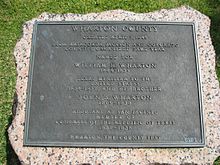| William Harris Wharton | |
|---|---|
 | |
| Republic of Texas Senator | |
| In office 1836–1839 | |
| Personal details | |
| Born | (1802-04-27)April 27, 1802 Virginia |
| Died | March 14, 1839(1839-03-14) (aged 36) Hempstead, Texas |
| Spouse | Sarah Ann Groce |
| Profession | Senator, soldier, minister |
William Harris Wharton (April 27, 1802 – March 14, 1839) was an American colonist, diplomat, senator and statesman in early Texas.
Early life and family
Wharton was born in Virginia and was raised by an uncle following the deaths of his parents. He graduated from the University of Nashville and was admitted to the Tennessee bar in 1826. Afterward, Wharton moved to Mexican Texas, and on December 5, 1827, married Sarah Ann Groce, the daughter of a wealthy landowner. Their only child was a son, John A. Wharton (1828–1865), who served in the American Civil War as a Confederate major general. The Wharton family established a farm known as Eagle Island Plantation.
Texas Revolution
| This section needs additional citations for verification. Please help improve this article by adding citations to reliable sources in this section. Unsourced material may be challenged and removed. Find sources: "William H. Wharton" – news · newspapers · books · scholar · JSTOR (July 2022) (Learn how and when to remove this message) |
Wharton served as a delegate to the Convention of 1832 from the District of Victoria. The convention unanimously elected him to deliver the resolutions to the legislature of Coahuila y Tejas (then a part of Mexico) in Saltillo and to the Mexican Congress in Mexico City.
Following that convention's unsuccessful attempts to form a new state separate from Coahuila y Tejas, Wharton served as president of the follow-up Convention of 1833 and openly advocated complete independence from Mexico, in contrast to the moderate view held by native Texans and others like Stephen F. Austin. Wharton later served as a delegate from the Columbia district to the Texas Consultation of 1835.
Wharton entered military service during the Texas Revolution, serving as a colonel and judge advocate general. He participated in the siege of San Antonio de Béxar in the fall of 1835. Shortly thereafter, he was appointed as one of three commissioners to the United States to secure aid for the Texians.
Senator
After the revolution resulted in the formation of the Republic of Texas in 1836, Wharton supported Austin's unsuccessful candidacy for president, which was instead won by Sam Houston. Wharton served as a member of the new republic's senate from the District of Brazoria in 1836.
In November, President Houston appointed Wharton as minister to the United States, hoping to secure political recognition and possible annexation. On March 3, 1837, the United States Senate voted to recognize Texas' independence. Returning to Texas in 1837 by sea, Wharton was captured by a Mexican ship and carried to Matamoros, where he was imprisoned. He escaped (allegedly by wearing a nun's habit) and returned to Texas to be re-elected to the Texas Senate in 1838.
Wharton introduced the "Lone Star" flag to Congress on December 28, and may have designed it.
Death

Wharton accidentally shot and killed himself while dismounting from his horse near Hempstead in Waller County, Texas, on March 14, 1839. He was buried at Rest wood Memorial Park in Clute, Texas.
Legacy
Both Wharton County, Texas, and its county seat, Wharton, were named for him and his brother John Austin Wharton (1806–1838), who was likewise a statesman of the Republic of Texas.
See also
References
- WEIR, MERLE (2010-06-15). "WHARTON, WILLIAM HARRIS". tshaonline.org. Retrieved 2019-04-12.
- ^ Merle Weir, "WHARTON, WILLIAM HARRIS," Handbook of Texas Online , accessed January 20, 2012. Published by the Texas State Historical Association.
- Davis (2006), p. 93.
- Humanities, National Endowment for the (1837-03-04). "Alexandria gazette. [volume] (Alexandria, D.C.) 1834-1974, March 04, 1837, Image 2". ISSN 1946-6153. Retrieved 2023-10-10.
- Wharton, William H.; Austin, Stephen F. (1922). Texas. Address of the Honorable Wm. H. Wharton, delivered in New York on Tuesday, April 26, 1836. Also, Address of the Honorable Stephen F. Austin, delivered in Louisville, Kentucky, on the 7th March, 1836. Together with other documents explanatory of the origin, principles, and objects of the contest in which Texas is at present engaged. The Magazine of history, with notes and queries. Extra number, no. 88 (v. 22, no. 4). Tarrytown, N.Y.: W. Abbatt.
- Haile, Bartee; Columnist, Texas History (2015-03-13). "Wharton brothers died before their time". The Courier. Retrieved 2019-04-12.
- Davis, William C. (2004). Lone Star Rising: The Revolutionary Birth of the Texas Republic. Free Press. ISBN 9780684865102.
External links
- Works by William H. Wharton at Project Gutenberg
- Works by or about William H. Wharton at the Internet Archive
- William Harris Wharton from the Handbook of Texas Online
- Texas state historical marker for Wharton
| Diplomatic posts | ||
|---|---|---|
| Preceded bypost created | Republic of Texas Commissioner to the United States 1835–1836 served alongside Stephen F. Austin and Branch T. Archer |
Succeeded byunique post for support of Texas independence |
| Political offices | ||
| Preceded byoffice created | Republic of Texas Senator from Brazoria District 1836 and 1837–1839 died in office 1839 |
Succeeded byAnson Jones |
- 1802 births
- 1839 deaths
- People from Virginia
- People from Tennessee
- People of Mexican Texas
- People of the Texas Revolution
- Convention of 1832 delegates
- Texas Consultation delegates
- Republic of Texas Senators
- Deaths by firearm in Texas
- Firearm accident victims in the United States
- Accidental deaths in Texas
- Wharton County, Texas